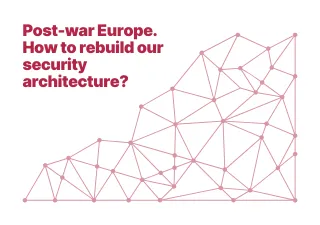Post-war Europe. How to rebuild our security architecture?
On the 35th anniversary of the Charter of Paris and the 50th anniversary of the Helsinki Accords, this project aims to reflect on the impact of the Russian invasion of Ukraine on Europe and Europe’s security architecture. In this context, European governments are likely to put under scrutiny the achievements and failures of Europe's security architecture and will be seeking for solutions to overcome the deep divides in existing institutions that shape this architecture.

The war in Ukraine is a game-changer which questions the post-cold war project of a united and converging Euro-Atlantic space. The settlement of the war in Ukraine will reshape the European Security Architecture along new lines. It will also create an opportunity to address other unresolved crisis situations such as frozen conflicts and territorial disputes. The settlement of Russia’s war of aggression against Ukraine requires a multifaceted approach. However, the global impact of the war in Ukraine contributes to fragment and polarize the international community. It is difficult to consider new negotiations on Europe’s security architecture in the present tense political climate, and without a clear vision of the outcome of the war. But that does not mean we should remain passive. Considering the growing insecurity and unpredictability in Europe brought about by this conflict, what can and should be done already now, is to invest thinking on how security can be re-established and settled for all, starting with exploratory discussions, brainstorming and generation of ideas. Though premature at this time, with a return to more stability in the region, the difficult process of rebuilding confidence will have to begin. There is need to get out of our echo chambers – and look for solutions. There is also need for a common vision on how today’s security challenges can be overcome, and in the longer term. With Zelenski’s 10 points plan proposed at the G20 in November 2022 and his call to organize an “international conference to cement the key elements of the post-war security architecture in the Euro-Atlantic space, including guarantees for Ukraine” this project is particularly timely.
The project is grounded on an independent analysis. The deliverable will be a publication reflecting the content of the partners’ discussions and provide testimonies of the project’s participants. It will be aimed at being solution- and policy-oriented and will provide governments and institutions with policy recommendations.
Coordinators:
French Institute of International Relations – Ifri (France)
Austrian Institute for International Affairs – oiip (Austria)
Partners:
Brandenburg Institute for Society and Security – BIGS (Germany)
Barcelona Centre for International Affairs – CIDOB (Spain)
Finnish Institute of International Affairs – FIIA (Finland)
Institute for European Politics – iep (Germany)
Kolegium Europy Wschodniej – KEW (Poland)
Slovak Foreign Policy Association – SFPA (Slovakia)


